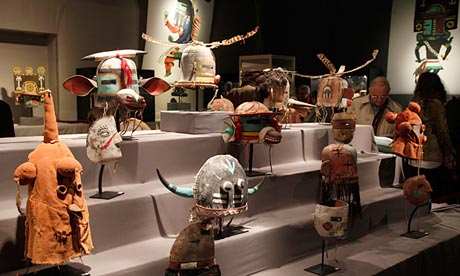
By Tara Oakes on Reuters.com
PARIS | Fri Apr 12, 2013 1:30pm EDT
PARIS (Reuters) – An auction of ancient masks revered as sacred by a Native American tribe fetched more than 750,000 euros on Friday, disappointing prominent opponents to the sale after a French court ruled it should go ahead.
The Hopi tribe of northeastern Arizona and supporters including the U.S. ambassador to France and actor Robert Redford had urged the Paris auction house to suspend the sale due to the masks’ cultural and religious significance.
But the court rejected a motion from the tribe and Survival International, a non-government group representing its interests, arguing that it could only intervene to protect human remains or living beings.
The auction went ahead in front of a standing-room only crowd, raising about 752,000 euros ($984,500) in pre-tax proceeds as collectors snapped up dozens of lots in a sale that lasted more than two hours.
A buyer who acquired four masks said he was delighted to be adding to his collection of Hopi artefacts.
“One day I might give some back,” said the collector, who declined to be identified. “But if it had not been for collectors in the 19th century who contributed to the field of ethnology, there would very little knowledge of the Hopi.”
Some disagreed. A man with Hopi origins studying in France was kicked out of the auction room for interrupting the sale with an angry speech. Several people trying to take photographs were also removed.
“We have lots of art that can be shared with other cultures, but not these,” said Bo Lomahquahu, 25. “Children aren’t even supposed to see them.”
The Neret-Minet, Tessier and Sarrou auctioneers said their collection of masks, priced between $2,000 and $32,000 apiece, was assembled by “an amateur with assured taste” who lived in the United States for three decades.
A spokeswoman for the auctioneers was not immediately available for comment.
“This decision is very disappointing,” said Pierre Servan-Schreiber, the lawyer for Survival International, a London-based advocacy group. “Not everything is necessarily up for sale or purchase, and we need to be careful.”

‘CRIMINAL GESTURE’
A chorus of opponents had weighed in on the dispute, arguing the Paris auction house should provide legal justification for selling the masks.
“To auction these would be in my opinion a sacrilege, a criminal gesture that contains grave moral repercussions,” Robert Redford wrote in an open letter.
The U.S. ambassador to France, Charles Rivkin, had urged the auctioneers to reconsider, saying in a statement late on Thursday: “A delay would allow the creators of these sacred objects the chance to determine their possible rights.”
Rivkin, who said that the auction house had yet to provide the Hopi Tribe with essential information about the objects, voiced his dismay in a Twitter message.
“I am saddened to learn that the sacred Hopi cultural objects are being put out to auction in Paris today,” he wrote.
The tribe’s legal advocates had sued the auctioneers at the Drouot-Richelieu auction house in central Paris on grounds that auctioning the masks would cause the Hopi “profound hurt and distress”.
Lawyer Quentin de Margerie bought mask 13, a design which mocks tourists, on behalf of Servan-Schreiber to give to the Hopi. He told Reuters few of the collectors understood the significance of the artefacts they were buying.
“It’s a symbolic choice,” de Margerie said. “What the Hopi have said about this auction is that people don’t understand their culture.”
($1 = 0.7618 euros)
(Reporting by Nick Vinocur, Chine Labbe, Lucien Libert; Writing by Nick Vinocur; Editing by Sonya Hepinstall)
